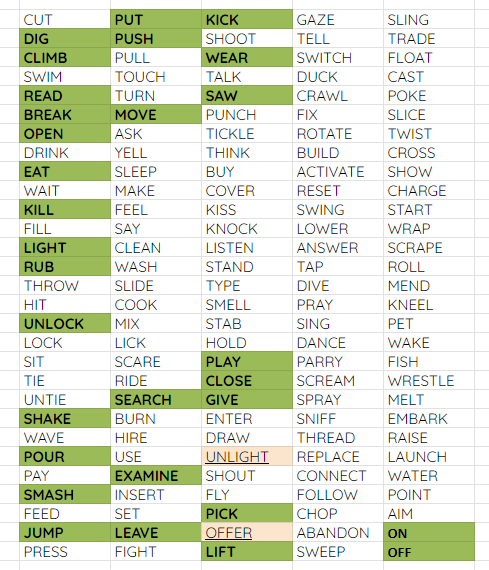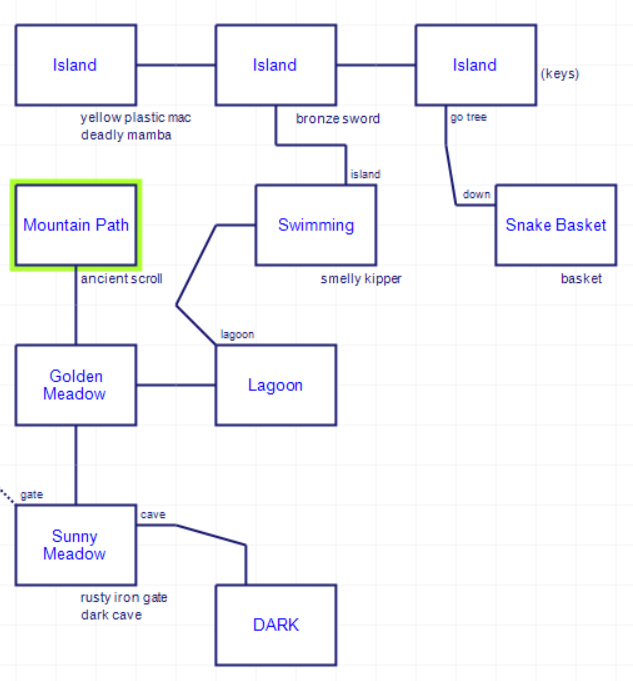
Guiseley, a suburb of Leeds.
Paul Standen describes his game Golden Apple (or Glod) as written when was a “schoolboy”; he sent it to a software company (not specifying which) back in 1982:
We do loads of adventures, we want arcade games is not what they said, but implied. I packed away my computer and joined a band.
He then brought it out again in 1990, and with the aid of David Hunter, converted it to a system called AMOS for Amiga, releasing it to the public domain. AMOS was meant to be a language for implementing games on the Amiga (that allowed for compilation) and is probably most comparable to something like Gamemaker today.

Via Dominic Ramsey.
He originally wrote it in “Scott Adams” style, although the game can be played more like an Infocom/Magnetic Scrolls game. I went with the author-preferred look.

To be clear, the author does not live at the address below any more, so my apologies if you are a “nice looking girl” who is wowed by the author’s writing prowess.

The object is simply to find and claim the golden apple, and the secret of immortality with it. The “claim” part is important because while I have found the apple I have not been able to get inside the container it is within and win the game.

Early on you find a “lagoon” where you can swim in and find a kipper. Examining the kipper indicates that snakes hate kippers.

This makes the next part seem like it ought to be easy, but I had to reckon with the parser a little.

The Scott Adams games quite universally had good noun discipline: if you saw a noun mentioned, you could at the very least refer to it. (It occasionally had a “secret noun” — that is, a noun you could refer to implied by the room description but not separated as a noun — but that doesn’t seem to apply to this game.) Because you do not need to refer to the mamba, the game here simply doesn’t even think that it exists in the corresponding parser command. This is a sign that the author isn’t using some kind of rigorous object-based system for their adventure but rather having parser commands accepted on the fly, making it harder to communicate with confidence.
This is a pattern of the game generally, where things are only half-implemented. It is a little like someone who writes a game based on a pre-written walkthrough but only does cursory checks for deviation. Mind you, you can at least die:

Swearing by the game was very unusual for this era. If anything the game chastised you for using such language. Also, the bronze sword is in the room adjacent to the snake and I haven’t found a use for it yet.
You don’t need to refer to the mamba because you can just drop the fish instead.

Past that is a tree, where if you climb it you find a basket full of snakes. I was baffled by the basket for a while.

At least you can refer to the basket with an examine command but the game fails to allow any interaction otherwise, including dying. Just in the spirit of experimentation I went back down to the tree (without climbing) and tested my various possible verbs on the tree itself.

I hit paydirt with SEARCH (which is distinct from EXAMINE in an unclear way), as the basket fell down from the tree along with some skeleton keys.

Moving on, there’s a dark cave and a locked gate.

The dark cave remains cryptic to me for now; you fall and die without a light source. The newly-found skeleton keys go to the gate, though, opening a new area.

The room descriptions look vivid but there’s not many objects to fill the imagination. There’s a spooky graveyard with a spooky house but I can’t even get nouns to be recognized in either.

The most glamorous location is a blood stained altar, where you can obtain a “shin bone”; just past that is a “vault” where you can find a “wishing staff”.

The wishing staff is quite odd and I suspect I’m missing something parser-wise. You can rub it to get the staff to shrink but only if you aren’t holding it.

EXAMINE STAFF gets the message “use it at the cliff” but I have tried to do so with no good result.

Not even JUMP at the cliff does anything. What self-respecting Scott Adams clone doesn’t let you jump to your doom, at least?
Mopping up the last locations, there’s a pond with some goldfish (can’t pick them up or refer to them in any way I can find) a field with a corn cob (which you can get, and is “corny”) and a door in a stump which leads to, perhaps anticlimactically, the golden apple.

In a narrative sense, having the golden apple be shown off so early is a strange move; in a gameplay sense, it is an interesting curveball. I’m guessing all we’re really questing for now is one good cutting item (some games use a diamond, so let’s say that).
I’m not ready to plunge into the source code yet (this is uncompiled, so I can read everything) but it is comforting to know it is there, because the somewhat hacky parser may turn out to be my nemesis.
(Thanks to benkid77 at the CASA forum who helped me find the game in the first place; you need to download the AMOS system separate from the Golden Apple source code which can be found on a public domain disk.)
Am I the only one who thinks it’s a little strange to say that a snake “legs it”?
On first reading it, I thought it said the sword was in the cat’s ass, which sounds like a bigger problem than it is. It just seems like a bizarre description regardless of whether it’s intended to be shocking or not.
What is the yellow plastic mac? Something tells me it’s not supposed to be plastic pasta.
Mac is short for Mackintosh, a kind of raincoat.
I presume that the sword is pretty great. The “cats ass” is usually a positive phrase such as “the bee’s knees” or “the cat’s pyjamas”. It could’ve been worse. The author could’ve used the similar phrase, “the dog’s b*ll*cks”. ;)
The comment about the Mac/Mackintosh coat reminds me of an issue in the Discworld fan community over a similar garment; the anorak. The confusion between that and an ankh amused Terry Pratchett so much that he commissioned a silver anorak that he could wear like an ankh on a chain. The Holy Anorak became quite a popular bit of merch.
Pingback: Golden Apple: The Dude Abides | Renga in Blue